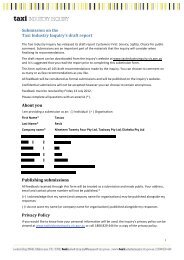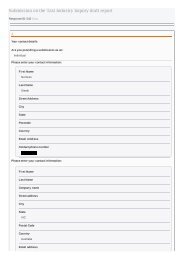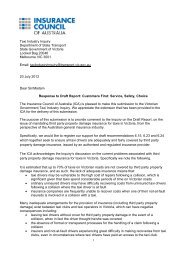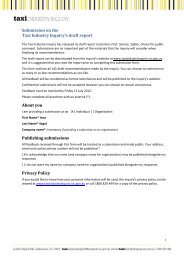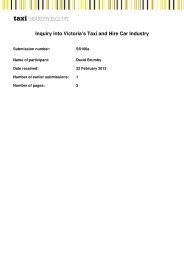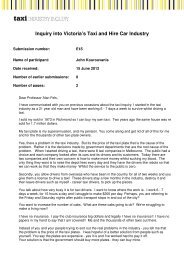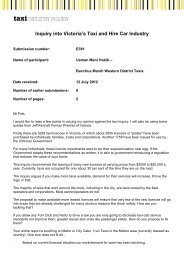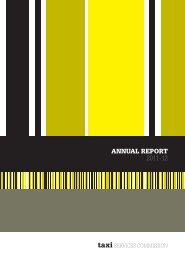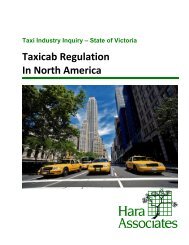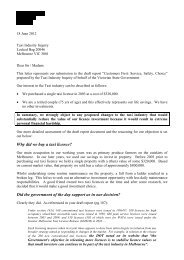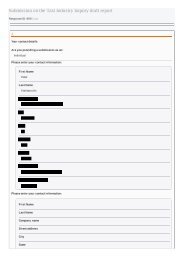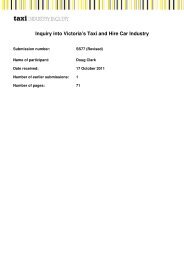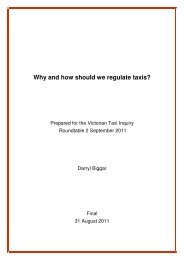Part D â Understanding and improving industry performance (PDF ...
Part D â Understanding and improving industry performance (PDF ...
Part D â Understanding and improving industry performance (PDF ...
Create successful ePaper yourself
Turn your PDF publications into a flip-book with our unique Google optimized e-Paper software.
The inquiry considers that there is a need to rationalise<br />
existing government regulation in relation to taxi networks<br />
<strong>and</strong> work to achieve a much more effective balance<br />
between <strong>industry</strong> self-regulation, government regulation<br />
<strong>and</strong> competition. The DOT appears to share this view<br />
although it is also concerned that there are underlying<br />
weaknesses with self-regulation.<br />
Fundamentally, it is DOT’s view that the accreditation<br />
schemes have been unable to significantly influence<br />
the motivations of <strong>industry</strong> participants because the<br />
underlying regulatory structure remains in place. As<br />
with previous legislative reforms in the sector, the<br />
accreditation regimes have simply layered new rules<br />
on to a regulatory model which has changed little<br />
since the 1930s. 42<br />
Significantly, the VTA is also highly critical of accreditation<br />
arrangements <strong>and</strong> in discussions with the inquiry has<br />
proposed an alternative structure where responsibility for<br />
managing quality services is the domain of networks <strong>and</strong><br />
not the regulator.<br />
The inquiry is sympathetic to the view that the <strong>industry</strong><br />
should be primarily responsible for service <strong>performance</strong>,<br />
though it has some qualifications to this view:<br />
• NSPs must have legal responsibility for the adequate<br />
<strong>performance</strong> of services provided under their br<strong>and</strong>s.<br />
Without affecting any responsibility that operators <strong>and</strong><br />
drivers have, it is considered that NSPs should be<br />
covered by the consumer guarantee provisions of the<br />
Australian Consumer Law (see case study).<br />
• NSPs should actively monitor the <strong>performance</strong> of<br />
their operators <strong>and</strong> drivers to ensure they adhere to<br />
appropriate st<strong>and</strong>ards.<br />
• NSPs need to implement customer complaint<br />
h<strong>and</strong>ling procedures that are in line with<br />
approved st<strong>and</strong>ards.<br />
• Procedures <strong>and</strong> remedies should be put in place to<br />
discipline operators <strong>and</strong> drivers who fail to adhere to<br />
appropriate st<strong>and</strong>ards. These procedures need to<br />
adhere to natural justice principles. They should include<br />
provisions to suspend an operator <strong>and</strong>/or driver from<br />
the network for an appropriate period of time.<br />
• Regular reports on service delivery should be<br />
provided to the regulator <strong>and</strong> the regulator needs to<br />
have powers to audit these reports as required.<br />
• NSPs <strong>and</strong> the regulator need to work collaboratively<br />
to ensure <strong>industry</strong>-wide sanctions can be imposed on<br />
persistent offenders.<br />
• Safety considerations must be of paramount<br />
consideration for the regulator <strong>and</strong> to its <strong>industry</strong><br />
monitoring <strong>and</strong> enforcement efforts need to focus<br />
particularly on this.<br />
Despite claims by the VTA to the contrary, the power to<br />
discipline operators <strong>and</strong> drivers was not taken away from<br />
them. NSPs continue to have the ability to seek liquidated<br />
damages from drivers <strong>and</strong> operators in relation to poor<br />
service <strong>performance</strong> <strong>and</strong> to impose penalties where<br />
these do not conflict with the general law. NSPs have<br />
argued that they do not have the capacity to adopt an<br />
even more effective measure, which would be to suspend<br />
a poor performer from the network for an appropriate<br />
period of time. It was suggested to the inquiry that this<br />
would involve a restraint of trade. However this matter<br />
was clarified by the Federal Court as far back as 2000. 43<br />
As long as the sanction imposed is arrived at fairly <strong>and</strong><br />
honestly <strong>and</strong> the sanction is necessary to protect the<br />
NSPs interests, an NSP can take this action.<br />
It seems the NSPs have felt compromised in taking action<br />
against drivers who have not performed adequately.<br />
To take a driver off the system would also potentially<br />
adversely affect operators who are the main source of<br />
income for the NSPs. Far from being a negative, however,<br />
the inquiry considers this would be a good thing as it<br />
would reinforce the incentives of operators, as well as the<br />
NSPs, to ensure drivers did the right things.<br />
The inquiry considers that it is essential to have a clear<br />
underst<strong>and</strong>ing of the respective responsibilities of NSPs<br />
<strong>and</strong> the regulator so that unnecessary duplication of<br />
roles is avoided <strong>and</strong> a more co-operative approach<br />
to regulation is achieved. Where possible, regulation<br />
imposed on NSPs should be outcome-based <strong>and</strong> avoid<br />
unnecessary prescription, which characterises the current<br />
regulation. To this end detailed discussions with the<br />
VTA have been held covering a large number of matters<br />
including the following:<br />
Fares<br />
• Fare refusal<br />
• Short fare<br />
• Refuse WAT work<br />
• Bookings<br />
Driver appearance<br />
• Driver identification<br />
• No uniform<br />
• Hygiene<br />
42 Department of Transport, Submission to the Taxi Industry Inquiry<br />
SS168, p.21<br />
43 Aerial Taxi-Cabs Co-op Society Ltd/as Canberra Cabs v Lee, FCA,<br />
1628, 2000<br />
<strong>Underst<strong>and</strong>ing</strong> <strong>industry</strong> <strong>performance</strong> CUSTOMERS FIRST 235



